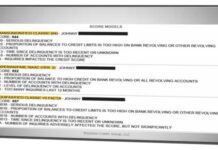Does Paying a Collection Hurt Your Score?
Yes! The reason why paying a collection hurt your score? A collection is coded as an “O-9” or collection/charge-off. This particular coding tells the algorithm (mathematical equation calculating your score) that we have something bad. In order to determine how much it is hurting your score, the algorithm looks at “Date of Last Activity” (DLA). The more recent the DLA, the more it hurts your score. Guess how the DLA gets updated to show more recently? By making a payment. So yes, paying a collection can and will hurt your score.
Perhaps you have heard that you should always request a “Letter of Deletion” prior to paying a collection.
This is true. But what if I told you there is a way you can settle a collection for far less what is owed and still get the item deleted?
Many collection companies will tell you “we do not offer a Letter of Deletion”. This is where being familiar with the law can assist you with getting the item removed and thus improving your credit score significantly.
Have you ever heard of a “Dunning Letter”?
The Dunning Letter falls under the Fair Debt Collection Practices Act (FDCPA). This rule modifies Regulation F, 12 CFR part 1006, which implements the Fair Debt Collection Practices Act (FDCPA), to impose Federal standards governing certain debt collection operations, as specified in the FDCPA. The final rule, among other things, clarifies the information that a debt collector must provide to a consumer at the outset of debt collection communications. This rule provides a model notice containing the information. It prohibits debt collectors from bringing or threatening to bring legal action against a consumer to collect a time-barred debt. It also requires debt collectors to take certain actions before furnishing information about a consumer’s debt to a consumer reporting agency.
The Dunning Letter is a required notice verifying that the collection agency has a legal right to collect on the particular debt in question. In the first 5 days of contacting the consumer on any debt, the collection agency must provide a letter to the consumer. In our experience, many collection agencies either fail to issue such notice, or send it to an incorrect, outdated, or invalid mailing address for the consumer. If you moved since the original debt was obtained, you may be in luck! The collection agency most likely sent the required notice to an out-of-date address.
Does paying a collection hurt your score? Yes!
As Always… In case you haven’t yet, here’s how you get started.
Step 1:
Tap or click here to get your $1 credit report.
We’ll need it to do your credit analysis.
Note:
This is for a $1 seven-day trial.
You can cancel it in the first seven days if you want, but we need this as a first step, in order to help you.
Step 2:
You will get a login and password for IdentityIQ when you set up your $1 trial.
Go to this page on TheCreditMovement.com.
Share your username/password for IdentityIQ in the form on the page.
We are here to help you buy a home. We will introduce you to a lender once you will qualify for the loan you want.






















